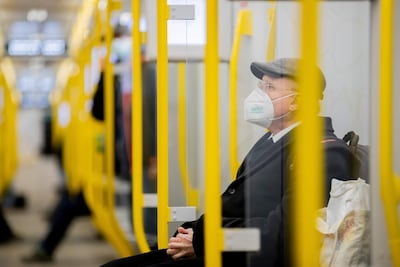Since the start of the pandemic, many small businesses have been making cloth masks that may be good for the environment but don't necessarily offer the necessary thickness and layers of fabric for full protection.
There is now international concern about cloth face coverings worn in public, with Germany and France leading calls for citizens to upgrade to medical-grade masks.
In the UK earlier this week, the government's chief scientific adviser Sir Patrick Vallance said face masks are most effective at protecting wearers from spreading Covid-19 to others, and are most useful when used indoors, such as in shops and supermarkets.
They are somewhat effective at protecting the mask wearer too, although it is unclear to what extent, Mr Vallance said.
He reiterated that everyone must continue to wear face coverings.
Germany's Chancellor Angela Merkel agreed on Tuesday that either single-use surgical FFP1 masks or more protective FFP2 filtering face piece respirators should be worn in the workplace, on public transport and in shops.
In France, masks are compulsory in all indoor public spaces, as well as on the streets in around 400 towns and cities, but the government guidance rules that only a mask fully covering the nose and mouth must be worn. People caught without masks or wearing them incorrectly face a €135 ($164) fine.
Last week, Didier Lepelletier, co-president of France's Covid-19 working group, said the group had decided that cloth masks – which are preferred by many people because they can be re-used – did not guarantee sufficient protection against the new Covid-19 variants.
The group recommended wearing a category 1 mask – those that filter more than 90 per cent of particles – rather than a category 2 covering.
Category 1 includes FFP2 filter masks, blue single-use surgical masks and certain types of fabric masks that meet specifications.

In one of his first actions as US president, Joe Biden signed a mask mandate, requiring that face coverings be worn inside buildings and on land controlled by the federal government.
That includes places like national parks and during interstate travel on trains, buses and aircraft.
The order also includes a "100 Days Masking Challenge" to encourage Americans to commit to wearing masks for at least that length of time and compels federal workers and contractors to follow other social-distancing guidelines recommended by the Centre for Disease Control and Prevention.
While the executive order does not have the authority to change mask policies in individual cities or states, President Biden “will call on governors, public health officials, mayors, business leaders, and others to implement masking, physical distancing and other public measures to control Coid-19," said Jeff Zients, co-ordinator of the new US administration’s pandemic response.
As countries introduce measures to prevent the spread of the UK, Brazilian and South African variants, it is thought many will amend face-covering advice and recommend the medical-grade masks.
Scientists warn that while face coverings can help control Covid-19 transmission in the community, they should not be a replacement for other coronavirus measures, such as social distancing.


